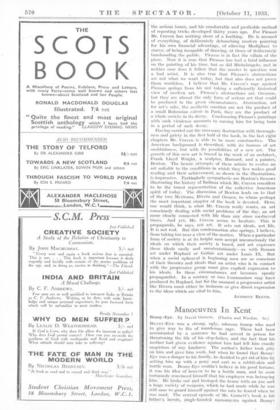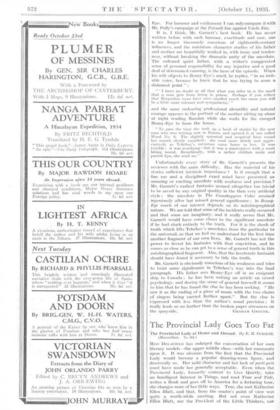Manoeuvres In Kent
lleany-Eye. By David Garnett. (Chatto and Windus. 5s.} BEANY-EYE was a strong, ugly, odorous tramp who used to give way to fits of murderous rage. These had been accentuated by a sentence he had served in prison for threatening the life of his step-father, and the fact that his mother had given evidence against him had left him crazily suspicious of any kindness. The author's father took pity on him and gave him work, but when he found that Beany.;, Eye was a danger to his family, he decided to get rid of him by setting him up with a pony and cart as a rabbit-skin and bottle man. Beany-Eye couldn't believe in his good fortune, it was his idea of heaven to be a bottle man, and he soon tortuously convinced himself that his employer was betraying him.' He broke out and, besieged the house with an axe and a huge variety of weapons, which he had made while he was still sane to guard himself against the rats he feared when ho was mad. The central episode of Mr. Garnett's book is his father's heroic, single-handed manoeuvres against Re.a.IlY/'
Eye. For humour and excitement I can only compare it with Mr. Pony's campaign at the Potwell.Inn against Uncle Jim..
It is, I think, Mr. Gairiiett'S best book. IIe has never written before with such humour, exactitude and case, one is no longer tiresomely conscious of eighteenth-centUry influences, and the miniature character studies of his father and mother are beautifully worked in, with irony and tender . ness, without breaking the dramatic unity of the anecdote. The cultured quiet father, with a writer's exaggerated sense of personal responsibility for any injustice and a good deal of determined cunning, is the, hero of the episode. When his wife objects to Beany-Eye's smell, he replies. " in an irrit- able voice, because he knew that he was trying to score a dishonest point" " I have no doubt at all that what you refer to is the smell that a man gets from being in prison. Perhaps if you reflect that Kropotkin ints3t have once smelled much the same you will be a little more tolerant and sympathetic,' "
and the same endearing professional absurdity and natural courage appears in the portrait of the mother sitting up alone ' at night reading Russian while she waits for the enraged Beany-Eye to burn the house.
" To pass the time she took up a book of stories by the new ' man who was 'writing now in Russia, and opened it at one called ...Ward No. 6. The slightly quizzical and sceptical lines round her mouth slowly vanished ; she read more slowly and appie- ciatively as Tchehov's intention came home to her. It was terrible ; it was scarifying—but it was a masterpiece with a most . biting moral. Breathlessly, with a rather childish smile and Parted lips, she read on."
Unfortunately every story of Mr. Garnett's presents the reviewer with the same difficulty. Has . the material of his stories sufficient intrinsic importance ? Is it enough that a
• fine ear and a disciplined exact mind have presented an amusing or exciting anecdote with neatness and precision ? Mr. Garnett's earliest fantasies seemed altogether too trivial to be saved by any original quality in the then very artificial style ; the anecdote in The Grasshoppers Cake strained ingeniously after but missed general significance ; in Bea4- Eye much of our interest depends on its autobiographical nature. We are told that some of the incidents really occurred and that some are imaginary, and it really seems that Mr. Garnett would have come closer to the significant anecdote if he had stuck entirely to the truth. For it is the shock of truth which lifts Tchehov's anecdotes from the particular to the universal, so that we feel we understand for the first time another fragment of our own lives. Mr. Garnett has not the :Tower to invest his fantasies with -that conviction, and he comes as close as he .ean get to a sense of general truth in this autobiographical fragment. Alas, that the inveterate fantasist should have found it necessary to tidy the truth.
- Mr. Garnett is obviously conscious of his weakness and tries to twist some significance in Tchehov's way into the final -paragraph. His father sees Beany-Eye off in an emigrant 'ship to Canada ; he has been writing an article on crowd .psychology, and during the scene of:general farewell it seems to him that he has found the clue he has been seeking. " He ,:saw it as the ending of a piece of music with the two choirs of singers being carried further apart." But the clue is .
expressed with less than the author's usual precision ; it really leads us no further than the broken paper streamers on































































 Previous page
Previous page